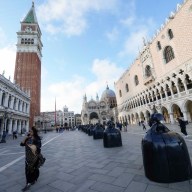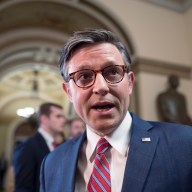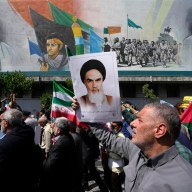By Robin Emmott
LUXEMBOURG (Reuters) – The European Union was divided on Monday over how to end a stand-off with Moscow over the crisis in Ukraine, as Britain called for governments to maintain their tough stance and Slovakia said the current sanctions policy was untenable. France reiterated the West’s position that there could be no change to the punitive sanctions on Russia’s defense, energy and financial sectors until Moscow dropped its support for separatist rebels in eastern Ukraine, although Paris wants EU leaders to also seek a rapprochement with the Kremlin. Incoming EU presidency chair Slovakia said EU governments could not ignore the political pressure in some EU countries for a shift in sanctions policy with Russia, the bloc’s biggest energy supplier. Slovakia’s Foreign Minister Miroslav Lajcak, whose country will help shape European policy from July to December, said it was necessary to hold talks because there was “a growing demand for a political discussion” about sanctions levied on Russia. Diplomats said such talk was code for potentially softening the measures implemented by the West in July 2014 after Moscow’s annexation of Ukraine’s Crimea in February of that year. Italy, Bulgaria and Greece are keen to see some sanctions lifted. “I am not calling for abolishing the sanctions. But what I don’t want to see is that we formally maintain the sanctions and behind the sanctions, everyone is signing big deals with Russia, visiting, meeting people who are blacklisted,” Lajcak said. “This is the reality today, so I think it is fair to discuss,” he told reporters in the margins of the EU foreign ministers’ meeting in Luxembourg.
EU envoys in Brussels are set to extend the sanctions on Russia on Tuesday until the end of the year. The United States and other Western nations have imposed similar sanctions.
The West accuses Russia of directly supporting the rebels, which Moscow denies. Western governments say any relaxation of the sanctions are linked to progress on a peace deal signed in Minsk last year to end the conflict in eastern Ukraine. The war has killed more than 9,000 people since April 2014 and NATO warned last week the internationally-monitored ceasefire in eastern Ukraine was barely holding..
That view was restated in Berlin on Monday by German Chancellor Angela Merkel, who helped negotiate the Minsk accord, following comments by her foreign minister saying he was in favor of lifting sanctions gradually if the Russian government took some steps linked to Minsk. Britain’s foreign minister said there could be no middle ground and that the Minsk peace deal, which includes a complete ceasefire in eastern Ukraine, needed to be implemented in full.
“If you want the sanctions relaxed, deliver your commitments at Minsk, not some of them, or moving towards, or talking about, but delivering,” Foreign Secretary Philip Hammond said. “The Russians are playing a game, frankly a game of divide and rule, targeting those who are temperamentally inclined to talk about relaxation, pressuring them. It is a big mistake.” (Additional reporting by Paul Carrel in Berlin)


















